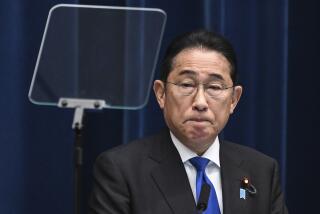Thailand’s Embattled Leader Loses Support of Governing Coalition : Protests: Newspaper reports that the prime minister agrees to resign after party chiefs said they are ready to replace him.
- Share via
BANGKOK, Thailand — Political support for embattled Prime Minister Suchinda Kraprayoon collapsed Friday, with a coalition of five governing parties saying it now is prepared to replace him after this week’s violent anti-government protests.
Today, The Nation newspaper reported that Suchinda met with King Bhumibol Adulyadej on Friday night and agreed to resign.
Earlier, Foreign Minister Pongpol Adirireksarn became the first Cabinet minister to distance himself from the prime minister, weeping openly at a news conference after meeting 60 foreign ambassadors to explain the events that led up to at least 40 deaths and hundreds of injuries.
“I have gathered opinions from outside and inside the country,” Pongpol told reporters, “and the results are the prime minister should be held responsible for what happened. The events will end and our image will be improved after we change the prime minister.”
The leaders of the five governing parties held a caucus to plot their political strategy in the wake of the violence and quickly decided to bow to opposition demands to amend the constitution.
The key point is a constitutional amendment requiring that the prime minister be an elected member of Parliament. Because Suchinda was appointed to the post April 7, passage of the amendment would make him “automatically unqualified,” said Deputy Prime Minister Meechai Ruchupan.
Parliament will begin consideration of the amendment Monday. Political sources said Suchinda would submit his resignation to Parliament then.
Some parties in the coalition had earlier favored the adoption of a “provisional clause” that would have allowed Suchinda to remain in power during a transitional period, but the idea was abandoned, said Montree Pongpanich, head of the Social Action Party.
Montree also tried to put distance between the prime minister and the parties that appointed him to the job. He said the five party leaders, who serve as deputy prime ministers, were never consulted about the use of military force against unarmed demonstrators.
Boonteng Thaongsawat, a leader of the Samakkhi Tham party, which won the most seats in the March 22 election, commented: “I think the government was too violent. The government should be held responsible and should resign--not just the prime minister, but the whole government.”
The parties, which had enthusiastically endorsed Suchinda on April 7, were reflecting a massive popular backlash against the use of firepower against unarmed protesters.
Until his appointment as prime minister, Suchinda was the supreme commander of the country’s armed forces. He was instrumental in the 1991 military coup that overthrew Thailand’s first democratic government in 12 years.
His resignation has been demanded by pro-democracy forces who see him as the latest example of the military interference that has infected Thai politics since the beginning of constitutional government in 1932.
With the violence apparently over and Bangkok trying to return to normal, several hundred people gathered Friday at the scene of the worst bloodshed and stood with heads bowed. The nearby Democracy Monument was draped in black. Soldiers continued to patrol downtown, and troops were also stationed at various government ministries.
The Confederation of Democracy, which has been leading the anti-government protests, Friday demanded the resignation of the country’s supreme commander and the army chief as well as Suchinda. The organization also demanded that the soldiers who fired the shots be brought to justice.
The confederation said it would hold a demonstration outside Parliament on Monday, the first big gathering since Thailand’s king intervened in the crisis Wednesday night and appealed for an end to the violence.
More to Read
Sign up for Essential California
The most important California stories and recommendations in your inbox every morning.
You may occasionally receive promotional content from the Los Angeles Times.










